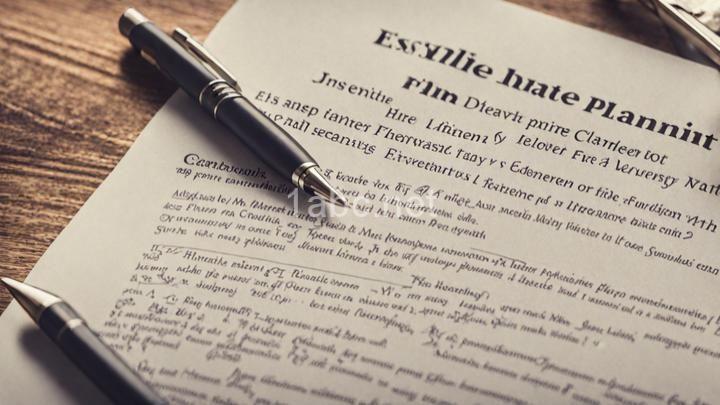The Benefits of Hiring a Financial Planner for Estate Planning

Introduction:
Estate planning is a topic that often evokes feelings of uncertainty and unease. We understand that thinking about the future and what happens to your assets after you're gone can be daunting. That's why we're here to help shed light on the importance of having a solid financial strategy in place and how hiring a financial planner can alleviate your concerns. In this blog post, we will explore the benefits of working with a financial planner for estate planning and why their expertise can make all the difference in securing your financial future.
I. Understanding Estate Planning:
Before we dive into the advantages of hiring a financial planner for estate planning, let's first clarify what estate planning entails. Estate planning is the process of arranging for the transfer of your assets to your loved ones or chosen beneficiaries after your passing. It involves taking stock of your assets, liabilities, and financial goals, and then creating a plan to ensure that your wishes are carried out smoothly.
Unfortunately, estate planning is often surrounded by misconceptions and fears. Some individuals may believe that it's only meant for the wealthy or that it's a morbid topic that they'd rather avoid. However, the truth is that estate planning is essential for individuals of all income levels, as it allows you to have control over how your assets are distributed and minimizes potential complications for your loved ones.
Hiring a financial planner can help alleviate these concerns by providing you with the guidance and expertise needed to navigate the estate planning process with confidence.
II. Expertise and Knowledge:
Financial planners bring a wealth of expertise to the table when it comes to estate planning. They are well-versed in complex financial matters, tax regulations, and legal requirements that are crucial for creating a solid estate plan.
By working with a financial planner, you can tap into their knowledge and experience to maximize your assets while minimizing taxes and potential complications. They can help you identify and take advantage of strategies that you may not have been aware of, ensuring that your estate plan is tailored to your unique circumstances and goals.
III. Tailored Financial Strategies:
One of the key benefits of hiring a financial planner for estate planning is the personalized approach they take. Financial planners understand that every individual's situation is unique, and they work closely with their clients to create tailored financial strategies.
During the estate planning process, a financial planner will take the time to assess your current assets, liabilities, and future financial goals. They will consider factors such as family dynamics, charitable giving desires, and legacy preservation to develop a comprehensive strategy that aligns with your wishes.
This personalized approach ensures that your estate plan reflects your values and goals, providing you with peace of mind knowing that your loved ones will be taken care of according to your wishes.
IV. Maximizing Wealth Preservation:
Preserving your wealth and ensuring its efficient distribution is a crucial aspect of estate planning. Financial planners play a vital role in helping you protect your assets through various strategies such as trusts, wills, powers of attorney, and beneficiary designations.
By utilizing these tools, financial planners can help minimize probate costs, avoid unnecessary taxes, and ensure that your assets are distributed in the most efficient manner possible. They can also assist in structuring your estate plan to provide ongoing financial support for your loved ones and future generations.
V. Continual Financial Monitoring:
Estate planning is not a one-time event but rather an ongoing process that requires regular review and adjustments. A financial planner will continue to monitor your financial situation and the ever-changing landscape of laws and regulations that may impact your estate plan.
This ongoing relationship ensures that your estate plan remains up-to-date and aligned with your current circumstances and goals. Life events such as marriage, divorce, birth of children, or changes in financial status may necessitate adjustments to your plan, and having a financial planner by your side provides the support and expertise needed to navigate these changes effectively.
Conclusion:
In conclusion, hiring a financial planner for estate planning offers numerous benefits that can make a significant difference in securing your financial future. Their expertise and knowledge in complex financial matters, personalized approach to crafting tailored strategies, and ability to maximize wealth preservation are invaluable assets throughout the estate planning process.
Furthermore, the ongoing relationship between clients and financial planners ensures that your estate plan remains up-to-date and aligned with your current circumstances. So why wait? Take the first step towards finding a financial planner that suits your needs and start securing your financial future today.
Remember, estate planning is not a topic to be feared but rather an opportunity to take control of your financial destiny and provide for your loved ones in the best possible way.
FREQUENTLY ASKED QUESTIONS
Why should I hire a financial planner for estate planning?
Hiring a financial planner for estate planning can provide numerous benefits and peace of mind. Estate planning involves a complex set of decisions and considerations, and having a professional by your side can make the process much smoother.Firstly, a financial planner specializes in managing finances and investments. They have the expertise to help you navigate through the intricacies of estate planning, ensuring that your assets are protected and distributed according to your wishes. They can help you create a comprehensive plan that takes into account your financial goals and priorities.
Additionally, a financial planner can provide objective advice and guidance. They can analyze your financial situation, identify potential risks, and recommend strategies to minimize taxes and maximize the value of your estate. With their knowledge and experience, they can help you make informed decisions and avoid costly mistakes.
Another advantage of hiring a financial planner is their ability to coordinate with other professionals involved in estate planning, such as attorneys and accountants. They can collaborate with these experts to ensure that all aspects of your estate plan are aligned and well-executed. This collaboration can save you time and effort, as well as provide a more holistic approach to your financial and estate planning needs.
Moreover, a financial planner can provide ongoing support and monitoring. Estate planning is not a one-time event, but rather a continuous process that requires regular review and adjustments. A financial planner can help you stay on track, update your plan as needed, and provide guidance during major life changes or financial challenges.
In summary, hiring a financial planner for estate planning can offer valuable expertise, objective advice, and comprehensive support. They can guide you through the complexities of estate planning, help you make informed decisions, and ensure that your assets are protected and distributed according to your wishes. Consider consulting with a financial planner to make the most of your estate planning journey.
How can a financial planner help me with estate planning?
A financial planner can provide valuable assistance when it comes to estate planning. They can help you navigate the complex financial landscape and ensure that your assets are distributed according to your wishes after you pass away. Here are a few ways in which a financial planner can help:
-
Comprehensive analysis: A financial planner will review your current financial situation and assess the value of your estate. They will take into account your assets, liabilities, investments, insurance policies, and any other relevant factors. This analysis will help them develop a tailored estate plan that aligns with your goals and objectives.
-
Tax efficiency: Estate planning involves understanding the tax implications of transferring assets to your beneficiaries. A financial planner can help you minimize estate taxes and optimize your estate plan to maximize the value that is passed on to your loved ones.
-
Asset protection: A financial planner can advise you on strategies to protect your assets from potential risks, such as lawsuits or creditors. They can help set up trusts or other legal structures that shield your assets and ensure they are used for the intended purposes.
-
Charitable giving: If you have philanthropic goals, a financial planner can help you incorporate charitable giving into your estate plan. They can assist with creating charitable trusts, foundations, or other vehicles that allow you to support causes that are important to you.
-
Legacy planning: Beyond simply distributing your assets, a financial planner can help you leave behind a meaningful legacy. They can assist you in documenting your values, wishes, and instructions for your loved ones. This may include considerations like educational funds for children or grandchildren, setting up a family foundation, or creating a lasting impact in your community.
It's important to note that while financial planners can provide guidance and expertise in estate planning, they typically work in collaboration with estate planning attorneys and other professionals to ensure that all legal aspects are properly addressed. Estate planning is a complex area, and seeking professional assistance can help you navigate the process with confidence and peace of mind.
What are the benefits of hiring a financial planner for estate planning?
Hiring a financial planner for estate planning can offer numerous benefits. Firstly, a financial planner possesses the expertise and knowledge required to navigate the complexities of estate planning. They can provide valuable advice and guidance tailored to your specific financial goals and circumstances.Secondly, a financial planner can help you create a comprehensive and effective estate plan. They can assist in identifying your assets, determining your beneficiaries, and ensuring that your wishes are clearly outlined in legal documents such as wills and trusts. This can help minimize potential disputes and ensure a smooth transfer of assets to your loved ones.
Additionally, a financial planner can help you optimize your estate plan from a tax perspective. They can provide strategies to minimize estate taxes and maximize the value of your assets for future generations. This can help preserve your wealth and provide financial security for your beneficiaries.
Furthermore, a financial planner can regularly review and update your estate plan to reflect any changes in your financial situation, family dynamics, or tax laws. This ongoing support can provide peace of mind and ensure that your estate plan remains relevant and effective over time.
Overall, hiring a financial planner for estate planning can offer professional expertise, personalized guidance, and peace of mind. It is an investment in securing your financial future and providing for your loved ones in the most efficient and effective way possible.
How do I choose a financial planner for estate planning?
When it comes to choosing a financial planner for estate planning, there are a few key factors to consider. First and foremost, it's important to find someone who specializes in estate planning and has extensive knowledge and experience in this area. They should be well-versed in estate laws, tax implications, and different strategies to help you achieve your estate planning goals.Another important factor to consider is the planner's credentials and qualifications. Look for professionals who hold relevant certifications, such as Certified Financial Planner (CFP) or Chartered Financial Consultant (ChFC). These designations indicate that the planner has undergone rigorous training and has met certain ethical and professional standards.
Additionally, it's a good idea to consider the planner's communication style and approach. Estate planning can involve sensitive and personal information, so finding someone who you feel comfortable discussing your financial matters with is crucial. Look for a planner who is empathetic, listens attentively, and takes the time to understand your unique needs and goals.
Furthermore, consider the planner's fee structure. Some financial planners charge a flat fee, while others may work on a commission basis. It's important to have a clear understanding of how they are compensated and whether their fees align with the services provided. Be sure to ask about any potential conflicts of interest that may arise from their compensation structure.
Lastly, don't forget to ask for references or testimonials from past clients. This can give you an idea of the planner's track record and the level of satisfaction their clients have experienced.
In summary, choosing a financial planner for estate planning requires careful consideration of their specialization, credentials, communication style, fee structure, and track record. Taking the time to find the right planner can help ensure that your estate planning needs are met effectively and efficiently.




